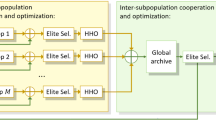Abstract
TLBO is a novel efficient swarm intelligent algorithm. In this paper, we first analyze TLBO and ETLBO algorithms in detail. Aiming at the disadvantage of ETLBO that it has to adjust the number of elite according to the different problems, we propose an improved adaptive ETLBO algorithm AETLBO-KAB that is based on K-armed bandit model. Experiments are carried out on six popular continuous non-linear test functions, and the results show that AETLBO-KAB algorithm is effective and brings dramatic improvement compared with TLBO and ETLBO. Furthermore, a new perturbation strategy—discussion group strategy is proposed. And the experimental results indicate that the efficiency of AETLBO-KAB with discussion group algorithm exceeds AETLBO-KAB algorithm.
Access this chapter
Tax calculation will be finalised at checkout
Purchases are for personal use only
Similar content being viewed by others
References
Kopec, D., Lucci, S.: Artificial Intelligence in the 21st Century. Mercury Learning and Information, Dulles (2012)
Zhang, C., Sun, J., Ouyang, D., Zhang, Y.: A self-adaptive hybrid particle swarm optimization algorithm for flow shop scheduling problem. Chin. J. Comput. 32(11), 2137–2146 (2009)
Xu, J., Zhang, W., Wang, T., et al.: A genetic algorithm based adaptive strategy for image backup of virtual machines. Chin. J. Comput. 39(2), 351–362 (2016)
Xia, Y., Cheng, B., Chen, J., et al.: Optimizing services composition based on improved ant colony algorithm. Chin. J. Comput. 35(2), 270–281 (2012)
Storn, R., Price, K.: Differential evolution: a simple and efficient adaptive scheme for global optimization over continuous spaces. J. Global Optim. 23(4), 341–359 (1995)
Holland, J.H.: Adaptation in Natural and Artificial Systems: An Introductory Analysis with Applications to Biology, Control, and Artificial Intelligence. University of Michigan Press, Ann Arbor (1975)
Kennedy, J., Eberhart, R.C.: Particle swarm optimization. In: Proceedings of IEEE International Conference on Neural Networks, pp. 1942–1948. IEEE Press, Piscataway (1995)
Dorigo, M., Maniezzo, V., Colorni, A., et al.: Positive feedback as a search strategy (1991)
Rao, R.V., Savsani, V.J., Vakharia, D.P.: Teaching–learning-based optimization: a novel method for constrained mechanical design optimization problems. Comput. Aided Des. 43(3), 303–315 (2011)
Rao, R.V., Savsani, V.J., Vakharia, D.P.: Teaching–learning-based optimization: an optimization method for continuous non-linear large scale problems. Inf. Sci. 183(1), 1–15 (2012)
Rao, R.V., Patel, V.: Multi-objective optimization of two stage thermoelectric cooler using a modified teaching–learning-based optimization algorithm. Eng. Appl. Artif. Intell. 26(1), 430–445 (2013)
Rao, R.V., Patel, V.: Multi-objective optimization of heat exchangers using a modified teaching-learning-based optimization algorithm. Appl. Math. Model. 37(3), 1147–1162 (2013)
Toğan, V.: Design of planar steel frames using teaching–learning based optimization. Eng. Struct. 34, 225–232 (2012)
Robbins, H.: Some aspects of the sequential design of experiments. Bull. Amer. Math. Soc. 58, 527–535 (1952)
Zhou, Z.: Machine Learning. Tsinghua University Press, Beijing (2016)
Gittins, J.C.: Multi-Armed Bandit Allocation Indices. Wiley-Interscience Series in Systems and Optimization. Wiley, New York (1989)
Tang, K., Yáo, X., Suganthan, P.N., et al.: Benchmark functions for the CEC’2008 special session and competition on large scale global optimization, pp. 153–177. Nature Inspired Computation and Applications Laboratory, USTC, China (2007)
Xu, K., Li, W.: Exact phase transitions in random constraint satisfaction problems. J. Artif. Intell. Res. 12, 93–103 (2000)
Acknowledgments
This work is supported by the National Natural Science Foundation of China (61170314,61373052), the Project of Jilin Provincial Science and Technology Development(20170414004GH).
Author information
Authors and Affiliations
Corresponding author
Editor information
Editors and Affiliations
Rights and permissions
Copyright information
© 2018 Springer Nature Switzerland AG
About this paper
Cite this paper
Wang, X., Zhang, Y., Cui, J. (2018). The New Adaptive ETLBO Algorithms with K-Armed Bandit Model. In: Liu, W., Giunchiglia, F., Yang, B. (eds) Knowledge Science, Engineering and Management. KSEM 2018. Lecture Notes in Computer Science(), vol 11062. Springer, Cham. https://doi.org/10.1007/978-3-319-99247-1_3
Download citation
DOI: https://doi.org/10.1007/978-3-319-99247-1_3
Published:
Publisher Name: Springer, Cham
Print ISBN: 978-3-319-99246-4
Online ISBN: 978-3-319-99247-1
eBook Packages: Computer ScienceComputer Science (R0)





